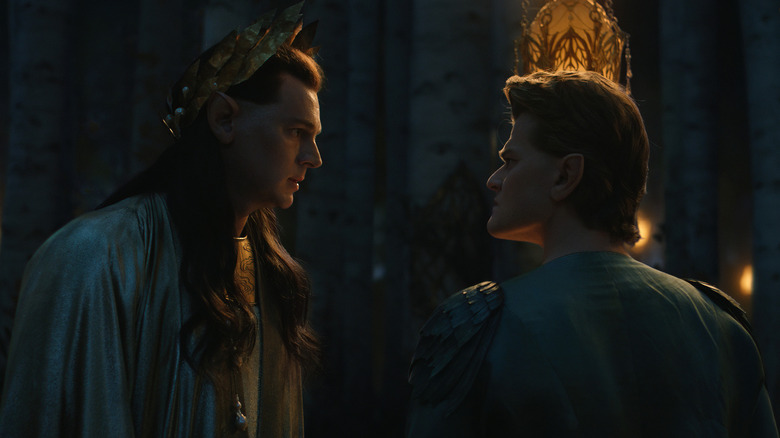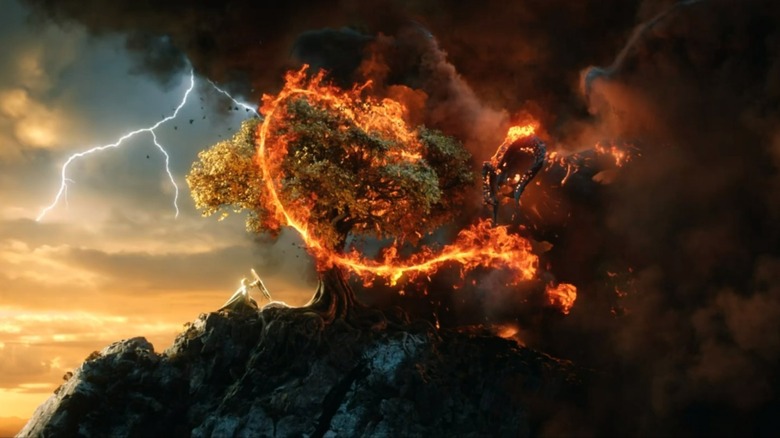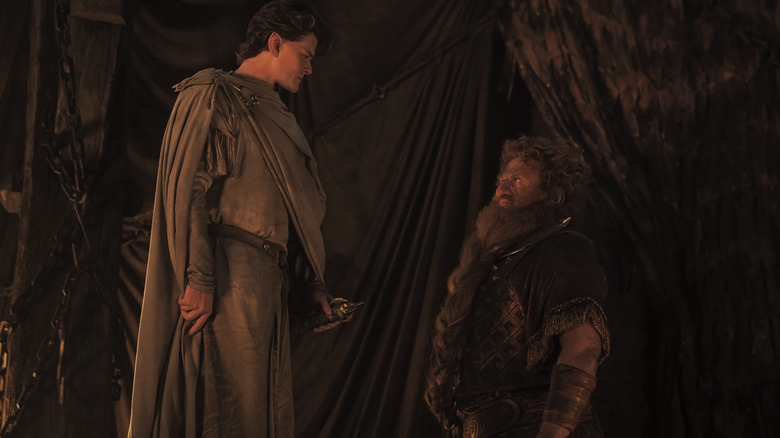Did The Rings Of Power Just Make Its Biggest Lord Of The Rings Lore Change Yet?
Spoilers for the latest episode of "The Lord of the Rings: The Rings of Power" follow.
Fans who pay close attention to such things realized quite some time ago that "The Lord of the Rings: The Rings of Power" would have no choice but to carve out a unique space for itself in the legendarium of author J.R.R. Tolkien.
Unlike Peter Jackson's "The Lord of the Rings" and "The Hobbit" trilogies, showrunners J.D. Payne and Patrick McKay and their team of writers didn't have the benefit of sprawling, self-contained novels to adapt from. Instead, Amazon Studios acquired the rights to the appendices featured at the end of "The Return of the King" novel (which laid out the events of the First and Second Age of Middle-earth), various novels like Tolkien's "The Unfinished Tales," and other notes. This forced them to get creative, using major canonical events as signposts — the defeat of Morgoth, the forging of the rings, the rise of Sauron — while filling in all the gaps in between with brand-new material.
As with any adaptation of any material, reasonable viewers knew that liberties would be taken and changes made to (our assumptions of) Tolkien lore along the way. Episode 5 of "The Rings of Power" just lived up to that in emphatic fashion, staging a visually stunning flashback scene that shook up our understanding of Middle-earth by tying together the Silmarils, the origins of mithril, and possibly an oblique reference to a famous elf warrior from the books. But as with any of our own commonly accepted legends and myths, things may not quite be as straightforward as they appear.
An elf, a balrog, and a tree walk into a bar...
Fresh off his discovery in a prior episode that the dwarves of Khazad-dûm have discovered invaluable quantities of mithril, Elrond (Robert Aramayo) is forced to decide between upholding the oath of secrecy he swore to his friend Prince Durin (Owain Arthur) and his responsibility to his people, who won't survive long without the light-giving properties of the precious ore. While internally struggling over this conundrum, High King Gil-Galad (Benjamin Walker) prompts young Elrond to remember a legend of old that he refers to as "The Song of the Roots of Hithaeglir." Hesitantly, Elrond recounts the "obscure legend regarded by most to be apocryphal" that involved an elf warrior with a pure heart guarding a tree that contains the last Silmaril against the hatred and darkness of a ravenous balrog. When lightning strikes the tree, the end result is the creation of mithril, imbued with the light of the Silmaril.
Although this may seem like classic, unfiltered Tolkien to the casual viewer, some may be surprised to learn that none of this was ever conceived by the fantasy author in the first place.
No fight between elf and balrog exists in Tolkien's writings as described here, though it certainly evokes some memorable duels over the centuries. Most famously, fans will recall the wizard Gandalf taking on a balrog in a similar location after he fell in the Mines of Moria in "The Fellowship of the Ring." But in "The Book of Lost Tales," Tolkien chronicles another elf fighting off a balrog under very different circumstances: The warrior Glorfindel made history for standing against the fearsome foe, though at the cost of his life (don't worry, he got better!) and no mithril was ever involved.
Blame the elves!
Call it a "retcon" or a "reimagining" if you will, but it certainly seems as if "The Rings of Power" just upended a major piece of how this world works ... but maybe not in the way it seems.
It certainly bears noting that Elrond himself is clearly skeptical of this story, even if Gil-Galad finally reveals the truth about the "blight" that appears to be sucking the life out of the Light of the Eldar. Although he's driven to ask Durin for his help to stem this decay, how sure can we be that the elves themselves aren't acting out of rashness and panic over circumstances that even they don't quite understand yet? After all, Gil-Galad admits that they mistakenly believed that sending Galadriel (Morfyyd Clark) away to the Undying Lands would stop the spread of the sinister-looking, plant-killing disease. Who's to say they aren't once again in the wrong here, too?
The fallibility of the elves may yet prove to have even greater consequences, however. This is pure speculation, full disclosure, but what if the real retcon at the heart of this episode has less to do with the origins of mithril and more to do with an even greater set of circumstances — the lasting enmity between elves and dwarves? Those aware of Middle-earth history know that such prejudices between the two races precedes the events of "The Rings of Power" and lasts long into the Third Age as well. By asking the dwarves to mine mithril, wouldn't the elves be directly responsible for why they delved "too greedily and too deep" and brought about their own destruction at the hands of an awakened balrog?
We'll see if this theory bears fruit. New episodes of "The Rings of Power" stream on Prime Video every Thursday.


